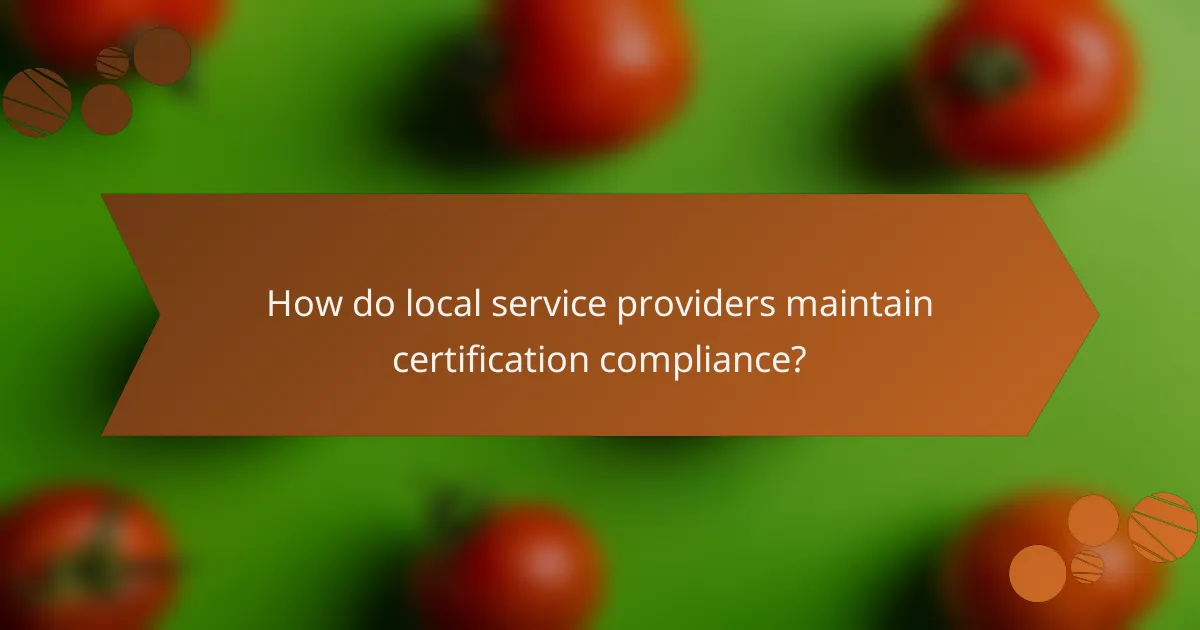Certifications play a vital role in local services by showcasing a commitment to quality and professionalism. They not only establish credibility and ensure compliance with regulations but also enhance customer satisfaction by providing assurance of a service provider’s competence and reliability.

Why are certifications important for local services?
Certifications are crucial for local services as they demonstrate a commitment to quality and professionalism. They help businesses establish credibility, comply with regulations, and ultimately enhance customer satisfaction.
Enhance credibility and trust
Certifications enhance the credibility of local services by providing a recognized standard of quality. When a service provider holds relevant certifications, customers are more likely to trust their expertise and reliability.
For example, a certified electrician or plumber is often seen as more competent than one without credentials. This trust can lead to repeat business and positive word-of-mouth referrals.
Ensure compliance with regulations
Many local services are subject to specific regulations that require certifications to operate legally. These certifications ensure that businesses adhere to safety standards and industry best practices.
For instance, food service establishments must often obtain health and safety certifications to comply with local health codes. Failing to meet these requirements can result in fines or the suspension of business licenses.
Improve service quality
Certifications often require service providers to undergo training and assessments, which can significantly improve the quality of their services. This ongoing education helps businesses stay updated on the latest techniques and technologies in their field.
As a result, customers benefit from higher service standards, leading to greater satisfaction and loyalty. For example, certified HVAC technicians are more likely to provide efficient and effective heating and cooling solutions.
Attract more customers
Holding certifications can be a powerful marketing tool for local service providers. Customers often seek out certified professionals when making decisions, as they perceive them to be more reliable and skilled.
Businesses can leverage their certifications in advertising and promotional materials to differentiate themselves from competitors. This can lead to increased inquiries and ultimately more sales, as customers feel more confident in choosing certified providers.

What are the key certification standards for local services?
Key certification standards for local services ensure quality, safety, and sustainability. These standards help businesses meet customer expectations and regulatory requirements, enhancing their credibility and operational efficiency.
ISO 9001 for quality management
ISO 9001 is an internationally recognized standard that focuses on quality management systems. It provides a framework for organizations to ensure they consistently meet customer and regulatory requirements while enhancing customer satisfaction.
To achieve ISO 9001 certification, businesses must demonstrate their ability to provide products and services that meet quality standards. This often involves establishing clear processes, conducting regular audits, and implementing continuous improvement practices.
Common pitfalls include neglecting employee training and failing to document processes adequately. Regular reviews and employee engagement can help maintain compliance and improve quality outcomes.
ANSI standards for safety
The American National Standards Institute (ANSI) develops safety standards that local services must adhere to in order to protect employees and customers. These standards cover a range of industries, ensuring safe practices and equipment usage.
Organizations seeking ANSI certification should assess their operations against relevant safety standards, implement necessary changes, and provide training to staff. Compliance not only reduces the risk of accidents but also enhances the organization’s reputation.
It’s crucial to stay updated on changes in ANSI standards, as they can evolve based on new safety data. Regular training sessions and safety audits can help maintain compliance and improve workplace safety.
LEED certification for sustainability
LEED (Leadership in Energy and Environmental Design) certification is a globally recognized mark of excellence in green building. It focuses on sustainable site development, water savings, energy efficiency, and indoor environmental quality.
To achieve LEED certification, local services must meet specific criteria across various categories, including energy performance and sustainable materials usage. This process often involves detailed assessments and documentation of building practices.
Businesses should consider the long-term benefits of LEED certification, such as reduced operating costs and improved public perception. Engaging with sustainability consultants can help navigate the certification process effectively.

How do certifications impact customer satisfaction?
Certifications significantly enhance customer satisfaction by providing a clear indication of a service provider’s competence and reliability. When customers see recognized certifications, they feel more assured that they are making informed choices about the services they use.
Increase customer confidence
Certifications increase customer confidence by validating a service provider’s skills and adherence to industry standards. For example, a contractor with a recognized certification in safety practices is more likely to be trusted by clients who prioritize safety in their projects.
Customers often look for certifications as a quick way to assess a provider’s credibility. This trust can lead to repeat business and positive word-of-mouth referrals, which are crucial for local service providers.
Provide assurance of service quality
Certifications assure customers of consistent service quality by ensuring that providers meet established benchmarks. For instance, a certified electrician must follow specific safety and performance standards, which translates to better service for clients.
Moreover, certifications often require ongoing education and recertification, which helps providers stay updated with the latest industry practices. This commitment to quality can significantly enhance customer experiences and satisfaction levels.

What are the steps to obtain certifications in local services?
Obtaining certifications in local services involves a series of structured steps that ensure compliance with industry standards and enhance service quality. These steps typically include identifying relevant certifications, preparing necessary documentation, and completing required training and assessments.
Identify relevant certifications
The first step in obtaining certifications for local services is to identify which certifications are applicable to your specific field. This may vary by industry, such as healthcare, construction, or food services. Research local regulations and industry standards to determine which certifications are recognized and valued in your area.
For example, in the United States, certifications like ISO 9001 for quality management or local health department certifications for food safety are common. Make a list of certifications that align with your business goals and customer expectations.
Prepare necessary documentation
Once you have identified the relevant certifications, the next step is to gather and prepare the necessary documentation. This may include proof of qualifications, business licenses, and compliance records. Ensure that all documents are current and accurately reflect your business operations.
It can be helpful to create a checklist of required documents for each certification. This may include items such as training certificates, insurance policies, and financial statements. Organizing these documents ahead of time can streamline the application process.
Complete training and assessments
Completing training and assessments is crucial for obtaining certifications in local services. Many certifications require specific training programs that cover essential skills and knowledge relevant to the service area. Look for accredited training providers that offer courses recognized by certification bodies.
After completing the training, you may need to pass assessments or examinations to demonstrate your competency. Be prepared for both written tests and practical evaluations, as these are common requirements. Scheduling time for study and practice can significantly improve your chances of success.

How do local service providers maintain certification compliance?
Local service providers maintain certification compliance through systematic processes that include regular audits, evaluations, and continuous staff training. These practices ensure that they meet industry standards and deliver quality services consistently.
Regular audits and evaluations
Regular audits and evaluations are critical for maintaining certification compliance. Providers typically conduct internal audits at least annually, assessing their adherence to established standards and identifying areas for improvement. External audits may also be performed by third-party organizations to ensure objectivity.
During these audits, service providers review documentation, operational procedures, and service delivery outcomes. This process helps to ensure that they are not only compliant but also continuously improving their practices to meet customer expectations and regulatory requirements.
Continuous staff training
Continuous staff training is essential for maintaining certification compliance in local services. Providers should implement ongoing training programs that cover relevant regulations, industry standards, and best practices. This ensures that all employees are equipped with the knowledge and skills necessary to perform their roles effectively.
Training can take various forms, including workshops, online courses, and hands-on sessions. Regularly updating training materials and incorporating feedback from audits can enhance the effectiveness of these programs, ultimately leading to improved service quality and compliance with certification standards.

What are the costs associated with obtaining certifications?
The costs associated with obtaining certifications can vary significantly based on the type of certification and the industry. Key expenses typically include application fees, training costs, and renewal fees, which can add up over time.
Application fees
Application fees are the initial costs required to submit a certification request. These fees can range from a few hundred to several thousand dollars, depending on the certification body and the complexity of the certification process.
When budgeting for application fees, consider that some certifications may have tiered pricing based on the applicant’s experience level or the size of the organization. It’s essential to check the specific requirements and associated costs on the certifying body’s website.
Additionally, some organizations offer financial assistance or discounts for early applications, so it’s wise to explore these options to reduce overall costs.
